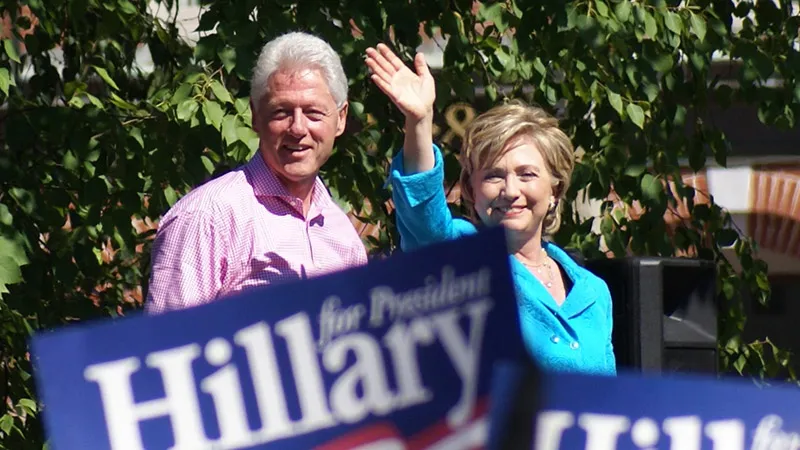How times change. In 1992, when Bill Clinton was elected to the White House, the Washington DC establishment was surprised. It had been expected that President George H. W. Bush would get a second term. Part of the reason for this was that the American capital city was comfortable and familiar with Mr. Bush, whether they backed him on individual policies or otherwise. He was a likeable man, a war hero and a pillar of American public life. His father, Prescott Bush, had been a Senator as far back as the 1950s.
In contrast, Bill Clinton was a nobody: A relatively unknown Governor from the southern state of Arkansas, with no illustrious family biography. While Mr. Clinton was a Rhodes scholar and a good communicator, the fuddy-duddy Washington DC set still a remnant of the so-called “Greatest Generation” that fought and won World War II, didn’t know what to make of someone who identified with the zeitgeist of the 1960s, with the beatniks, rock-and-roll and the Beatles.
Indeed, the Indian Ambassador in the United States in 1992, the venerable Siddhartha Shankar Ray, was so much at home with the Republican aristocracy and the Bush crowd that he was barely in touch with the Clinton team. He had sent reports to New Delhi confidently predicting re-election for President Bush. That absence of outreach to an outsider candidate was to cost India in Mr. Clinton’s first term. It taught the Indian Embassy valuable lessons. In no future election have Indian diplomats not covered all flanks.
In 1992, Mr. Clinton and his wife, Hillary — who was clearly going to have more of a policy role than previous first ladies, particularly on health care reform — seemed to represent a political counterculture. Gradually, over two presidential terms and then Ms. Clinton’s stints as a Senator and at the State Department (as Secretary of State), Washington, DC, socialised them. They became part of the establishment.
Ironically, the Clintons and the Bushes are friends now. Mr. Clinton has worked closely with the man he defeated in 1992 in several post-retirement public initiatives and sees him as a father-like figure. More substantially, as centre-right Democrats, the Clintons have an appeal for Republicans unhappy with Donald Trump’s populism and of course Barack Obama’s constituency to the left.
This makes Ms. Clinton the establishment candidate for the 2016 presidential election. Should she get elected in November, she will have little difficulty settling into office in January. The Beltway will rally around her. A plethora of bipartisan talent will be available for her to pick from, given many old-school Republican policy wonks are gravitating towards the Clinton corner and distancing themselves from Mr. Trump.
Yet, this very fact, that she is so establishmentarian and perceived as so much of a Washington, DC, insider is also and paradoxically Ms. Clinton’s greatest disadvantage. This is especially so in an angry, acrimonious election, where disaffection, economic uncertainty, identity and inequality have been mixed into a heady cocktail of class war and patriotism.
So how will November go? With three months left, a lot could change and the polling numbers are still indecisive. The demographics would suggest a victory for Ms. Clinton, given Mr. Trump has put off so many categories, from minorities to women. Even so, there are a few imponderables. Mr. Trump leads among white males by a long way. Among white women, considered Ms. Clinton’s loyal vote, the Democratic candidate’s lead is much smaller than expected. Blacks are unlikely to vote for Mr. Trump with any great enthusiasm but unlikely to turn up for Ms. Clinton with the fervour they showed for an Obama candidacy or perhaps even for Bill Clinton in the 1990s.
Mr. Trump has taken great trouble to insult and alienate Hiic voters. Having said that, on issues of religious conservatism, the economy and welfare, sections of Mexican and Cuban origin voters have tended to move right. George W. Bush took a slice of this vote in 2000 and 2004. Can Mr. Trump recover some ground here, especially if he sells himself as a leader equipped to combat terrorism? Even a small shift can make a difference in a close race.
So bizarre is this election that pollsters are openly saying “unforeseen events” could influence the verdict — a euphemism for a violent or terror attack. As an American friend said recently, every major shooting incident in the US is being scrutinised closely. Is it a white man attacking minorities such as gays? Is it a black person attacking whites and law enforcement officers? Is it an immigrant or descendant of a recent immigrant attacking anybody? Is the assailant someone with a vaguely Muslim name? Ghoulish as it appears, each of these has a different electoral implication and will be used differently by either Mr. Trump or Ms. Clinton.
Frankly, neither party has chosen well. Both Mr. Trump and Ms. Clinton leave one with the feeling of being one-term candidates who will gave way to either genuine change and conviction (in the Democratic Party) — or a more wholesome rendition of the social and philosophical traditions of the Republican party. In a battle of sub-par choices, Ms. Clinton is betting on a mobilisation of elites, minorities, liberals and middle-of-the roaders against Mr. Trump. On the other hand, Mr. Trump is hoping to offset his own polarising personality with the fact that Ms. Clinton herself has a history of negotiable political positions, and is a public figure who is admired and loathed in equal measure. Not an election one would want to predict.
This commentary originally appeared in The Pioneer.
The views expressed above belong to the author(s). ORF research and analyses now available on Telegram! Click here to access our curated content — blogs, longforms and interviews.




 PREV
PREV


